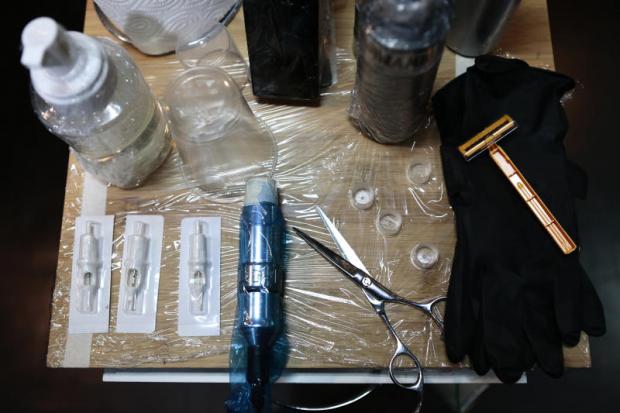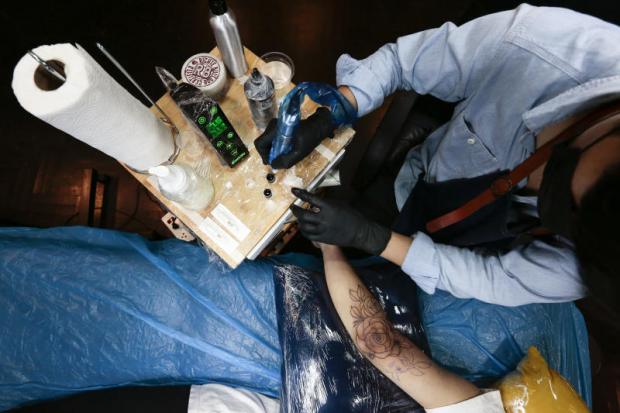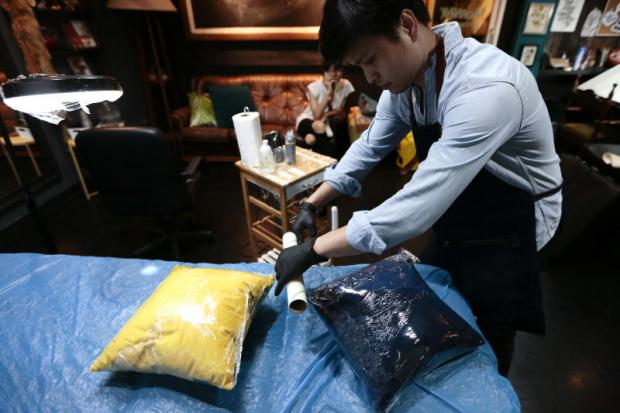
Those who love body art are on alert following a news report that a man in Loei claimed his 22-year-old daughter died of complications from Human Immunodeficiency Virus (HIV) late last month and all of her three friends who went to get tattoos together in Bangkok in March had also died.
Many doctors and medical personnel quickly rebutted the claim and told the public that it is not possible that HIV can develop at such a pace. However, sanitary and safety concern related to tattooing has been raised.
"It's not possible to reach stage three in five months or even a year," said Dr Alisra Tatakorn, doctor and director of the Bangkok Metropolitan Administration's Aids, Tuberculosis and Sexually Transmitted Disease Control Division, Health Department.

The deceased girl spent her last days in Chiang Mai at Nakhon Ping Hospital where she learned that she was at the third stage of HIV -- the stage where a patient is often diagnosed with Acquired Immune Deficiency Syndrome (Aids).
The girl succumbed on the last day of August, with her death certificate stating the causes of death were hypovolemic shock, acute diarrhea, and Stage 3 HIV.
The certificate said she had been living with HIV for over a year at the time of her death.
Elaborating on the nature of HIV, Dr Alisra said that about two weeks after being exposed to the virus, patients will experience fever and swollen lymph nodes.
The second phase in which it will appear that the patient has nothing wrong with their body then ensues and lasts about eight to 10 years before reaching Stage 3 in which the patient is diagnosed with Aids.
The hardest to treat, stage three, is when the patient's weakened immune system is hit by certain HIV-related opportunistic infections such as pneumonia, salmonella infection, candidiasis (thrush), toxoplasmosis, and tuberculosis (TB).
Still, the shortest duration in which the disease can reach stage three is three years, a rarity which can occur when people living with HIV are repeatedly exposed to the virus without taking HIV medicine. This, for her, renders the claim that the girl contracted HIV and died five months later not possible.
Dr Alisra said there have been no reported cases in Thailand of people getting HIV from tattoos or other types of body art such as piercing.
However, she did not rule out the theoretical possibility of getting HIV from tattoos since tattooing leaves skin with open wounds and the virus can also be transmitted by a needle stick injury via a reused or improperly sterilised needle or other equipment, or from contaminated supplies, according to Dr Alisra.
"You should make sure that the place has good hygiene, the needle is new, all the equipment is sterile, and your skin is properly disinfected during the process," she said.
A more plausible concern regarding diseases which can be transmitted via tattoo procedures and body piercing are other blood-borne diseases, such as hepatitis C and hepatitis B. Even so, there have been no reports of people getting either hepatitis C or B via tattoos in Thailand.
"Hepatitis C is 10 times easier to contract than Hepatits B which is 10 times easier to contract than HIV," she said.
Unprofessional or unsanitary tattoo parlours can expose customers of other types of concerns such as infection from pathogens such as bacteria during and after tattooing.

HIGH-TECH ART: The shop is equipped with apparatus and digital devices for tattooing.
In countries that keep a good records of HIV transmission such as the United States, there are no known and verified cases of anyone getting HIV through tattooing or body piercing, according to the US Centres for Disease Control and Prevention (CDC).
The CDC, however, acknowledges the potential risk of transmission of blood-borne viruses through tattooing or body piercing, but said the risk is considered low to negligible.
Under Notification of the Ministry of Public Health on Health Hazardous Businesses 2015, local administrations must license tattoo and body piercing businesses.
However, the Bangkok Metropolitan Administration (BMA) for its part has never fully established the number of tattoo operators.
But it said in Bangkok there are currently only 50 licensed tattoo parlors, 15 of which are located in Phra Nakhon district.
Following reports of the recent death of the 22-year old woman, the tattoo shop Khlong Lod which she visited has been temporarily closed, pending improvements in hygienic standards.
According to BMA officials, an inspection found the shop -- which is a mobile tattoo operation hitched on the back of a bicycle in Khlong Lod near Sanam Luang in Phra Nakhon district -- did not have adequate standards of practice. Inspectors found that labels on needle packages were peeling, and ink containers were not replaced.

HAVE NO FEAR: A tattoo artist works on his customer at a tattoo parlour in Udomsuk area of Bangkok. The shop was required to meet standard of cleanliness and hygiene before it was granted a licence.
Tattoo artist Somchai Ariya, the shop owner, insisted that sanitation was his top priority and that he only tattooed one of the four people who died.
Nevertheless, he insisted no one had ever complained of getting any infection from his service.
The BMA will conduct a review and call all tattoo practitioners to practice sanitation and safety training. Also, practitioners who fail to obtain a licence will risk a 50,000 baht fine and six months in jail.
Chanan Tokrisna, a tattoo artist and owner of Tattoo O'd Studio on Sukhumvit 53 Road, said tattoo shops evolve and nowadays give priority to sanitary and safety.
"Every now and then we would see news of infections from getting tattoos, but this is very rare," he said.
"Quite a few years ago a number of tattoo parlours would use old tattoo equipment which requires them to be cleaned and sanitised with alcohol, and even in those days infections were extremely rare. Nowadays, the majority of shops use single-use needles which guarantees cleanliness in accordance to international standards," Mr Chanan added.
As a tattoo shop owner, Mr Chanan supports issuing regulations, framework and licensing for the shops to create a trustworthy and legitimate ecosystem for ink enthusiasts.
"It's not that we don't want regulations, we are yearning for them. No matter how stiff and complicated they will be we are ready to comply because the goal is to be recognised by authorities so that our customers are confident in our quality and safety precautions," he said.

ALL WRAPPED UP: A tattoo artist coats the pillows and bed with cling film to ensure hygiene before serving a customer.
"Thailand is opening up to the culture of tattooing and it's becoming more socially acceptable. With many respectable figures like movie stars and football players having tattoos, Thais are moving away from the conventional ideology that those who are inked are bad people. This growth demands recognition from the state. There are 50 parlours in Khao San alone so we must draft policies," Mr Chanon said.
Amon Kamsaeng, owner of Mornink Tattoo Studio in the Udomsuk area, said new technology and equipment can help with precision and speed. While customers pay more attention to safety and hygiene, he wraps the bed and pillows with plastic sheets and replaces these sheets and uses new needles every time.
Another side of Thailand's ink culture are the world-famous yantra tattoos which Thais and many Southeast Asian countries believe possess magical powers including an ability to protect the wearer from harm.
Comprising geometrical shapes, animals and deities, the techniques used by many acclaimed "teachers" in Thailand rely on an older edition of steel needles rather than the modern single-use alternative.
"There are many ex-monks who leave the temple and devote their time and effort to yantra tattoos; they become well-respected and admired. Therefore when a question of sanitation and public safety is being raised we take this seriously," said Ajarn A, a yantra tattooist who wants his identity concealed.
"The entire industry of yantra tattooing has moved forward from the traditional bamboo needle to steel needles, but the steel needles we use require self-cleaning with alcohol. This has never been a problem, although some are allergic to the chemicals found in tattoo inks."
Ajarn A revealed that although the majority of yantra tattoos have never resulted in an infection, he did admit that each teacher acquires ink from various sources.
Therefore, some manufacturers such as those in China might have products tainted with chemicals not found in others.